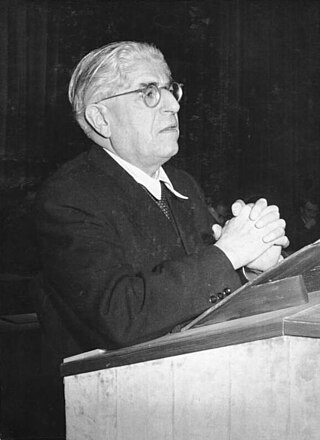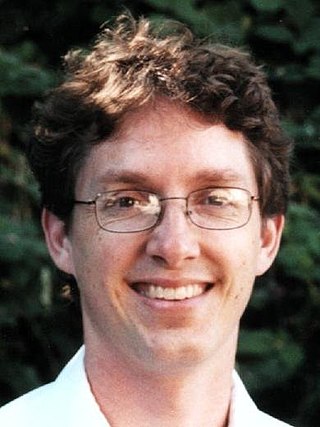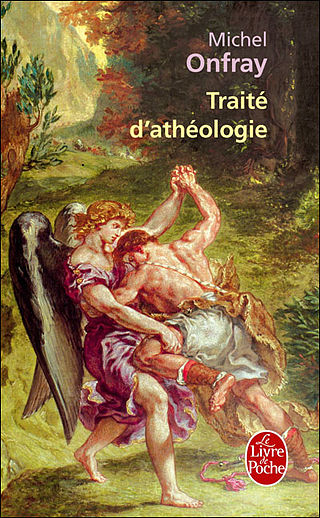
Bruno Bauer was a German philosopher and theologian. As a student of G. W. F. Hegel, Bauer was a radical Rationalist in philosophy, politics and Biblical criticism. Bauer investigated the sources of the New Testament and, beginning with Hegel's analysis of Christianity's Hellenic as well as Jewish roots, concluded that early Christianity owed more to ancient Greek philosophy (Stoicism) than to Judaism.

Christian communism is a theological view that the teachings of Jesus compel Christians to support religious communism. Although there is no universal agreement on the exact dates when communistic ideas and practices in Christianity began, many Christian communists argue that evidence from the Bible suggests that the first Christians, including the Apostles in the New Testament, established their own small communist society in the years following Jesus' death and resurrection. Many advocates of Christian communism and other communists, including Karl Kautsky, argue that it was taught by Jesus and practised by the apostles themselves. This is generally confirmed by historians.

Ernst Simon Bloch was a German Marxist philosopher. Bloch was influenced by Georg Wilhelm Friedrich Hegel and Karl Marx, as well as by apocalyptic and religious thinkers such as Thomas Müntzer, Paracelsus, and Jacob Böhme. He established friendships with György Lukács, Bertolt Brecht, Kurt Weill, Walter Benjamin, and Theodor W. Adorno. Bloch's work focuses on an optimistic teleology of the history of mankind.

State atheism or atheist state is the incorporation of hard atheism or non-theism into political regimes. It is considered the opposite of theocracy and may also refer to large-scale secularization attempts by governments. To some extent, it is a religion-state relationship that is usually ideologically linked to irreligion and the promotion of irreligion or atheism. State atheism may refer to a government's promotion of anti-clericalism, which opposes religious institutional power and influence in all aspects of public and political life, including the involvement of religion in the everyday life of the citizen. In some instances, religious symbols and public practices that were once held by religions were replaced with secularized versions of them. State atheism in these cases is considered as not being politically neutral toward religion, and therefore it is often considered non-secular.
Atheism is the rejection of an assertion that a deity exists. In a narrower sense, positive atheism is specifically the position that there are no deities, effectively taking the stance of a positive claim in regards to the existence of any goddess or god. The English term 'atheist' was used at least as early as the sixteenth century and atheistic ideas and their influence have a longer history.
Antireligion or Religiophobia is opposition to religion or traditional religious beliefs and practices. It involves opposition to organized religion, religious practices or religious institutions. The term antireligion has also been used to describe opposition to specific forms of supernatural worship or practice, whether organized or not. The Soviet Union adopted the political ideology of Marxism–Leninism and by extension the policy of state atheism which opposed the growth of religions.
Criticism of atheism is criticism of the concepts, validity, or impact of atheism, including associated political and social implications. Criticisms include positions based on the history of science, philosophical and logical criticisms, findings in both the natural and social sciences, theistic apologetic arguments, arguments pertaining to ethics and morality, the effects of atheism on the individual, or the assumptions that underpin atheism.

Richard Cevantis Carrier is an American ancient historian. He is a long-time contributor to skeptical websites, including The Secular Web and Freethought Blogs. Carrier has published a number of books and articles on philosophy and religion in classical antiquity, discussing the development of early Christianity from a skeptical viewpoint, and concerning religion and morality in the modern world. He has publicly debated a number of scholars on the historical basis of the Bible and Christianity. He is a prominent advocate of the theory that Jesus did not exist, which he has argued in a number of his works. However, Carrier's methodology and conclusions in this field have proven controversial and unconvincing to most ancient historians, and he and his theories are often identified as fringe.
Christian atheism is an ideology that embraces the teachings, narratives, symbols, practices, or communities associated with Christianity without accepting the literal existence of God. It often overlaps with nontheism and post-theism.

Atheism, agnosticism, scepticism, freethought, secular humanism or general irreligion are increasing in Australia. Post-war Australia has become a highly secularised country. Religion does not play a major role in the lives of much of the population.
19th-century German philosopher Karl Marx, the founder and primary theorist of Marxism, viewed religion as "the soul of soulless conditions" or the "opium of the people". According to Marx, religion in this world of exploitation is an expression of distress and at the same time it is also a protest against the real distress. In other words, religion continues to survive because of oppressive social conditions. When this oppressive and exploitative condition is destroyed, religion will become unnecessary. At the same time, Marx saw religion as a form of protest by the working classes against their poor economic conditions and their alienation. Denys Turner, a scholar of Marx and historical theology, classified Marx's views as adhering to Post-Theism, a philosophical position that regards worshipping deities as an eventually obsolete, but temporarily necessary, stage in humanity's historical spiritual development.
Postchristianity is the situation in which Christianity is no longer the dominant civil religion of a society but has gradually assumed values, culture, and worldviews that are not necessarily Christian. Post-Christian tends to refer to the loss of Christianity's monopoly in historically Christian societies to atheism or secularism. It does not include formerly Christian societies that now mostly follow other religions like Islam, such as parts of the Balkans and the Middle East.
The term New Atheism describes the positions of some atheist academics, writers, scientists, and philosophers of the 20th and 21st centuries. New Atheism advocates the view that superstition, religion, and irrationalism should not be tolerated. Instead, they advocate the antitheist view that the various forms of theism should be criticised, countered, examined, and challenged by rational argument, especially when they exert strong influence on the broader society, such as in government, education, and politics. Critics have characterised New Atheism as "secular fundamentalism" or "fundamentalist atheism". Major figures of New Atheism include Richard Dawkins, Sam Harris, Christopher Hitchens, and Daniel Dennett, collectively referred to as the "Four Horsemen" of the movement.

The Rage Against God is the fifth book by Peter Hitchens, first published in 2010. The book describes Hitchens's journey from atheism, far-left politics, and bohemianism to Christianity and conservatism, detailing the influences on him that led to his conversion. The book is partly intended as a response to God Is Not Great, a book written by his brother Christopher Hitchens in 2007.

Atheist Manifesto: The Case Against Christianity, Judaism, and Islam is a 2005 book by French author Michel Onfray. According to Onfray, the term "athéologie" is taken from a project of a series of books written and compiled by Georges Bataille under the vocable La Somme athéologique, which was ultimately never completed.

Irreligion is prevalent in Germany. In a time of near-universal adoption of Christianity, Germany was an intellectual centre for European freethought and humanist thinking, whose ideas spread across Europe and the world in the Age of Enlightenment. Later, religious tradition in Germany was weakened by the twin onslaughts of Nazi rule during World War II and that of the Socialist Unity Party in East Germany during the Cold War. In common with most other European societies, a period of secularisation also continued in the decades that followed. While today Christianity remains prevalent in the west of Germany, in the east relatively few Germans identify with any religion whatsoever.
Marxist–Leninist atheism, also known as Marxist–Leninist scientific atheism, is the antireligious element of Marxism–Leninism. Based upon a dialectical-materialist understanding of humanity's place in nature, Marxist–Leninist atheism proposes that religion is the opium of the people; thus, Marxism–Leninism advocates atheism, rather than religious belief.

Milan Machovec was a Czech philosopher who lectured at the Charles University in Prague in 1950–1970 and again from 1990 until his death. He had studied philosophy and classical philology there amidst the onset of the Czechoslovak communist era, becoming docent of the history of philosophy in 1953. Although a convinced socialist and scientific atheist, Machovec retained his earlier passion for liberal democratic and Catholic worldviews, generally identifying with humanism. In the 1960s, he organized Christian-Marxist dialogue visited by Czech- and German-speaking thinkers including Erich Fromm, Ernst Bloch or the theologian Karl Rahner. The planned publication of his major work on Jesus, however, was destroyed in 1969 after the Prague Spring, a national reform movement in which he participated and whose suppression he protested internationally with an open letter.









